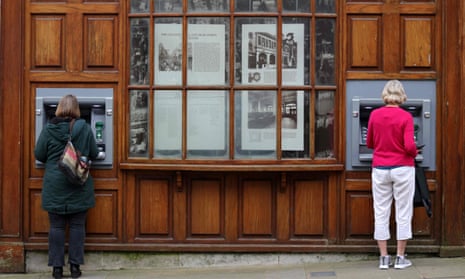High street banks will have to ensure customers can find access to cash within three miles of their local communities, and those falling below the minimum service level will face a fine, the government has confirmed.
After the closure of thousands of local branches in recent years, and the switch to digital payment methods, ministers are looking to banks to help protect vulnerable groups and elderly customers by maintaining present levels of cash access across the UK.
The “vast majority” of people are able to withdraw money within one mile, if they live in cities, and three miles if they live in rural areas, the Treasury said. That includes cash withdrawals through cash machines, bank branches and shops offering free cashback.
The government said the Financial Conduct Authority (FCA) would make sure banks and building societies were “keeping up to these standards – and have the power to fine them if they do not”.
On Thursday, the former Ukip leader Nigel Farage went to Downing Street to hand in a petition that called on the government to crack down on businesses that have increasingly instituted card-only policies and refused to accept cash since the Covid crisis.
🚨Breaking: GB News presenters hand in the Don’t Kill Cash petition to Number 11 Downing Street, as the campaign fast approaches 300,000 signatures. #DontKillCash pic.twitter.com/OP5UF7JTAZ
— GB News (@GBNEWS) August 17, 2023
It marks Farage’s latest campaign against banks and payment companies, after Coutts threatened to close his accounts this year. The row snowballed in July after he obtained documents that showed his political views were part of the decision to shut his accounts.
The scandal resulted in the resignation of Alison Rose as chief executive of the bank’s owner, NatWest Group. It also led to the ousting of Peter Flavel as the chief executive of Coutts. Farage said the bank had since offered to keep his accounts open.
Thursday’s announcement on access to cash builds on the wide-ranging Financial Services and Markets Act 2000, which gave consumers a legal right to access cash and handed powers to enforce those rules to the FCA.
Andrew Griffiths, the economic secretary to the Treasury and “City minister”, said: “People shouldn’t have to trek for hours to withdraw a tenner to put in someone’s birthday card – nor should businesses have to travel large distances to deposit cash takings.
“These are measures which benefit everyone who uses cash but particularly those living in rural areas, the elderly and those with disabilities.”
The Treasury hinted there may be some concessions to the three-mile guarantee, saying in a press release that the FCA should “maintain this level of coverage, while recognising that needs may differ by location and change over time”.
And while personal banking customers will be guaranteed fee-free access, it is highly probable that businesses in some areas may still face fees for withdrawals and deposits.
The FCA is expected to launch its consultation this autumn, meaning the laws are unlikely to come into force until summer 2024.
after newsletter promotion
Campaigners have long warned that the UK’s dwindling cash facilities – after swathes of ATM and bank closures – are putting elderly and vulnerable people who struggle to maintain bank accounts online at risk.
Access to cash has also become more important during banking outages, which can block card transactions and online bank transfers. About 5.4 million adults use and rely on cash daily, according to Treasury statistics.
Natalie Ceeney, chair of the independent Access to Cash Review, said: “Over the past decade, we’ve been sleepwalking into a cashless society. But digital payments don’t work for everyone.
“Cash remains vital for millions of people and businesses, many of whom are struggling as bank branches close and it becomes harder to access and deposit cash.”
She said the cash access distance guidelines would help “support the specific needs of different communities”.
She added: “That doesn’t mean that nothing will change, but it does mean that where services plan to close, there need to be appropriate alternatives in place before they do so. Positively, the banking industry is ahead of the curve in helping to create new banking hubs and deposit services in communities.”
The banking lobby group UK Finance said: “We support the work the government and FCA are doing here and look forward to reviewing the government’s full policy statement when published.”
